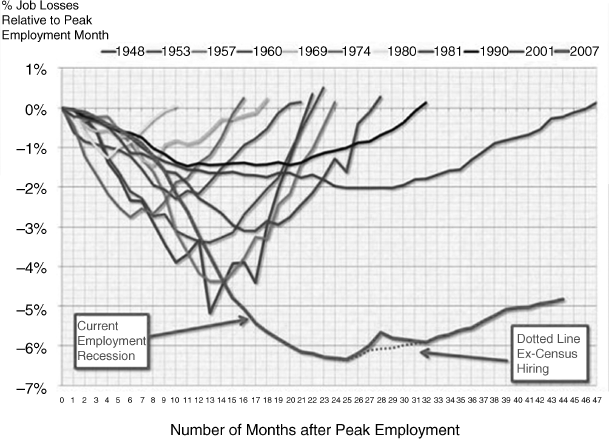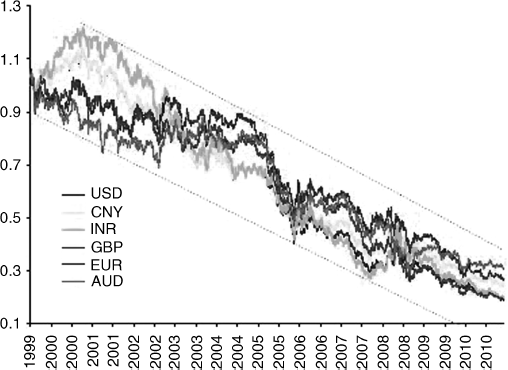Chapter 1
Why Gold?
Once a certain indicator or investment approach works for a while, word of its money-making capabilities spreads like wildfire. Then, when everyone is aware of its potential, it becomes factored into the price and the relationship breaks down.1
—Martin Pring
To set the record straight, I am not arguing with the fundamental reasons behind gold's move. I agree that the reasons why gold prices have increased make sense. Gold is a tangible store of value: It provides protection against inflation, and some even say it protects against deflation. Gold is also a fear trade during times of uncertainty or panic. These are fundamental reasons that explain why gold prices should go up. The problem, however, is that while these characteristics justify the rise of gold prices, they do not justify the extremity of the current gold prices. In other words, gold went up for a reason, but it has gone up too far. The individuals who have invested in gold may have acted rationally, but their actions are not as favorable if so many others are persuaded to behave in the same way. Therefore, using these arguments to justify further increases in gold prices is no longer useful because these fundamental reasons are already priced-in.
It is speculation of further price increases that runs the price of gold far beyond fair value. The fair market value of gold may be hard to pinpoint, but by definition, a bubble trades at prices well beyond where they should be based on historical average—or fair value.
The reasons behind the gold surge are understandable.
 Gold has historically been a store of value. Because people will always want more gold, it has been used as a form of exchange for thousands of years. With global acceptance and negotiability, gold is a first choice for many as a noncurrency form of wealth. The more gold you own, the richer you are.
Gold has historically been a store of value. Because people will always want more gold, it has been used as a form of exchange for thousands of years. With global acceptance and negotiability, gold is a first choice for many as a noncurrency form of wealth. The more gold you own, the richer you are.
 Gold is a tangible asset. At a time when the stability of stocks, derivatives, and other financial instruments are in question, gold offers a tangible and supposedly “stable” alternative. Gold is a hard asset you can actually hold in your hands.
Gold is a tangible asset. At a time when the stability of stocks, derivatives, and other financial instruments are in question, gold offers a tangible and supposedly “stable” alternative. Gold is a hard asset you can actually hold in your hands.
 Gold has limited supply. In order to increase the amount of gold in circulation, we have to mine it. Mines are obviously not limitless; there is a specific amount of gold in the earth's crust, and when we deplete all of the earth's gold reserves, supply will cease to grow. And if demand is continuous while supply is limited, gold prices are expected to keep rising. In other words, if more people demand gold and gold is a limited resource, the price of gold should rise.
Gold has limited supply. In order to increase the amount of gold in circulation, we have to mine it. Mines are obviously not limitless; there is a specific amount of gold in the earth's crust, and when we deplete all of the earth's gold reserves, supply will cease to grow. And if demand is continuous while supply is limited, gold prices are expected to keep rising. In other words, if more people demand gold and gold is a limited resource, the price of gold should rise.
 Gold acts as a currency hedge. As the U.S. dollar has plummeted and as fears over the euro have escalated, because of uncertainties of the future of the Eurozone's economy, gold has been perceived as a way to avoid the potential disaster that unfolds if “paper” money becomes worthless. When investors buy gold, they assume that should world economies fail, gold will still be accepted as currency.
Gold acts as a currency hedge. As the U.S. dollar has plummeted and as fears over the euro have escalated, because of uncertainties of the future of the Eurozone's economy, gold has been perceived as a way to avoid the potential disaster that unfolds if “paper” money becomes worthless. When investors buy gold, they assume that should world economies fail, gold will still be accepted as currency.
Figure 1.1 shows how weak fiat currencies have been versus gold since 1999.
 Gold as a fear hedge. Massive debt levels, high market volatility, and a constant looming threat of economic collapse have all spurred the buying of gold as a protection against the worst possible outcomes. With the United States experiencing the worst unemployment situation since the Great Depression, it's easy to understand why many investors have come to expect the worst. See Figure 1.2.
Gold as a fear hedge. Massive debt levels, high market volatility, and a constant looming threat of economic collapse have all spurred the buying of gold as a protection against the worst possible outcomes. With the United States experiencing the worst unemployment situation since the Great Depression, it's easy to understand why many investors have come to expect the worst. See Figure 1.2.
Figure 1.2 Percentage of Job Losses in Post–World War II Recessions, Aligned at Maximum Job Losses
Source: Business Insider, calculatedriskblog.com (6/3/11).

 Gold as an alternative to equities. Following the stock market devastation we have lived through, from the bursting of the dot-com bubble in 2000 to 2002 and the collapse of the housing bubble in 2007 to 2009, many investors have almost completely lost faith in stocks. But with a desperate need to increase their wealth in order to support their own lifestyles, pay for their childrens' education, and/or fund their retirements, investors continue to search for some form of investment that will meet their needs. Out go stocks, in comes gold—if stocks haven't worked, maybe a historically valuable, tangible, limited, and protective asset such as gold can.
Gold as an alternative to equities. Following the stock market devastation we have lived through, from the bursting of the dot-com bubble in 2000 to 2002 and the collapse of the housing bubble in 2007 to 2009, many investors have almost completely lost faith in stocks. But with a desperate need to increase their wealth in order to support their own lifestyles, pay for their childrens' education, and/or fund their retirements, investors continue to search for some form of investment that will meet their needs. Out go stocks, in comes gold—if stocks haven't worked, maybe a historically valuable, tangible, limited, and protective asset such as gold can.
While these reasons are understandable, they don't necessarily support the extent of gold's surge. Yes, they do support gold prices going up. But who says they support a 600 percent move?
Rapid price run-ups tend to diverge from the underlying fundamental reasons for their move. In other words, as people start getting overly excited about a certain investment theme, they actually run the price up too far, too fast. Their reasons for jumping in may be accurate, but their enthusiasm pushes investors to actually get ahead of themselves. Prices can't go up forever, and they eventually start to drop. And as more and more people start to realize this, prices plummet even faster. This marks the bursting of the bubble that will eventually see prices crash and many people worse off than before. And if gold is the current bubble, this fate awaits many people now investing in it.
Gold has a laundry list of great reasons to buy it. Gold bugs, apocalyptic doomsayers, and those who are discontent with government policy and volatile markets have all relied on gold's historical value as a reason to own gold. Fearing the worst outcomes—the collapse of the dollar or a stock market crash—investors and much of the financial world have put their faith in gold, assuming its significance will provide them with a “safe haven” if markets and currencies collapse.
Rationally speaking, however, there is likely no such thing as a “safe haven” that could protect investors from plunging asset prices. Some assets, such as growth stocks or complex derivatives, are riskier than other assets, such as defensive stocks and high-rated, secure bonds; but if stocks and economies fall, all asset prices will fall together with them, including gold. Using history as a benchmark is a necessary and smart investment approach, but only when viewed by the perspective of price changes and sentiment. In other words, using gold's historical significance as a reason to buy it makes a lot of sense, but not if prices have soared to unsustainable levels or if those buying gold are too euphoric. Once an investment theme becomes “overcrowded,” it is no longer supported by history and fundamentals—it has become dependent on the psychology of crowds.
In the next chapters, we will explain which outside factors have enabled gold's surge, why using gold's historical significance is tremendously misleading, and how so many clues point to a gold bubble that is driven by fear, greed, and the need for stability.
